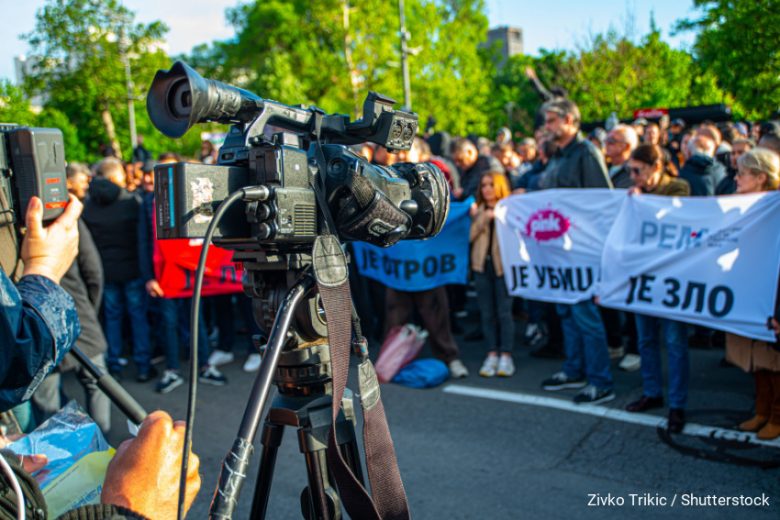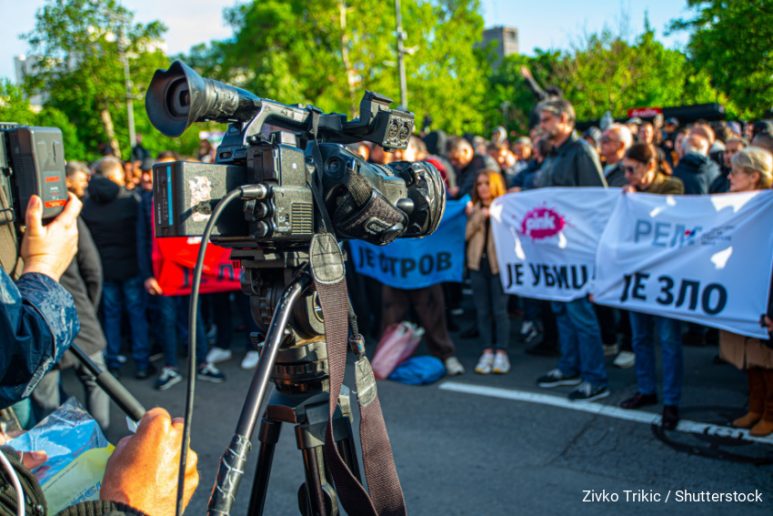By Anja Andjusic
In the early hours of the morning of 3 May, eight students and a security guard were killed and six students and a teacher injured during a school shooting in Belgrade, Serbia. This was not only a personal tragedy for the victims, their families, and communities, but a tragic event that struck Serbia’s society as a whole. It was the first time Serbia faced a crime of this scale for a long time.
It didn’t take long for some media to engage in unethical reporting. The media speculated on the number of dead and injured long before parents received official information from relevant institutions on the health and safety of their children. Television channels with national coverage and a large audience such as Pink and Prva also published unverified information about a teacher being killed, which was later confirmed not to be true. Apart from being against the law and journalistic standards, this kind of reporting, especially in sensitive situations like this one, is irresponsible, harmful, and can even be dangerous to everyone affected.

TV Prva conducted a live interview in front of the school with a student who witnessed the shooting less than two hours after it happened. Her face was not blurred, and the journalist called her by her first name, further violating her privacy by revealing her identity. Other media outlets shared her statement, amplifying the negative effects. According to Serbian law “The media service provider is obliged to protect the identity of minors, if there are indications that they are a perpetrator, witness or victim of violence, a criminal act or other illegal behavior or if they have attempted suicide.” Media breached the Code of Journalists of Serbia by interviewing students and parents immediately after the shooting. When reporting on violent crimes such as this one, it is crucial to put the dignity and privacy of the victims, witnesses, and everyone affected as a priority.
However, the regulations did not stop the Serbian media reporting on every single detail about the shooting and the people who were affected. The full name, picture, medical reports, and multiple statements the accused 13-year-old shooter gave to police officers and social workers were leaked to the public in a matter of hours and have flooded the mainstream and social media for the past several days. This violates both his and the victims’ right to privacy and therefore is against several laws and regulations, but is also a usual manner of reporting on violent crimes for Serbian media. They are rarely held accountable for it.
Institutions and government officials also failed to protect the privacy of everyone involved, especially minors. At a special press conference that was broadcasted live on almost all television channels with national coverage, the head of the Police Department for the City of Belgrade, Veselin Milić, announced the full name and surname of the accused juvenile perpetrator and quoted the statement he gave to police. He also showed evidence from the ongoing investigation including a sketch of the plan of the school shooting and a list of names being targeted. This was extremely irresponsible and dangerous as the public now had more details about the shooting than it was ever necessary. This trend was continued by the President of the Republic of Serbia himself, Aleksandar Vučić, who, during his press conference, shared in detail information about the accused shooter including about his father, his work and salary, his medical records and the ongoing investigation. After this, the media only continued in the same manner, pushing sensationalist content and republishing information that should have been protected in the first place.
This was not in the public’s interest and has only amplified the negative effects of this tragic event. The media in Serbia are obliged by several regulations to “protect the identity of minors even when this has not been done by a public authority or another person, including another media publisher”. When extensive details about mass shootings are shared in such a way, this can potentially lead to imitating violent behaviour and wider effects of social contagion.
Sensationalism in media reporting on the school shooting was not only reflected in thoroughly dissecting this case and everyone involved, but also in repeating harmful messages that amplified the voices of people who were not experts in relevant fields for this topic, but rather just wanted to share their opinion on the event. It is always important that the media only contacts significant and professional sources, which is even more important when dealing with sensitive topics. Tabloids and other mainstream media also created sensationalist “clickable” phrases which have been repeated endlessly, such as calling the crime a “bloody massacre” and the shooter a “child monster”. Such media coverage is unnecessary, not in the public interest, and only serves for clicks and profit. It is extremely harmful to victims, their families and society, as it adds to collective trauma, and incites fear. Excessive details and media attention can potentially increase the chances of such violent crimes being repeated in the near future, therefore further jeopardizing public safety.
The day after the shooting, the news was filled with various incidents at schools across Serbia where children were making threats and bringing toy guns to school. A day after that, the country faced another tragic event – a mass shooting near Mladenovac, in which eight people were killed and 13 injured. Serbia observed three days of national mourning and has an atmosphere of collective shock and great sadness..
As the United States of America has the highest number of school shootings, several USA research papers deal with the effects of media reporting on these crimes. They all share the same findings –harmful media reporting can provoke copycat incidents by people who may see the perpetrators as models or heroes, further traumatise survivors, families, and communities and additionally stigmatise people with mental illness and negatively affect those who are struggling with mental health.
Undoubtedly, the media have a huge role in reactions to violent crimes, and it seems they have failed when reporting on the school shooting in Belgrade. Even though critics immediately warned of the potential harmful effects if their reporting, it seems as if mainstream media learned nothing, as they repeated the same mistakes when reporting on the mass shooting in Mladenovac.
Social media beamed with sensationalist content about the shootings as well, with children and young people leaving comments that make jokes and justify the school shooting, and even videos reenacting the crime. This was another shock and cause for worry in the public, followed by condemnation and misunderstanding. In an interview for Buka magazine, psychologist Ivana Jakšić explained this phenomenon by saying that “Due to the inability to cope with the negative emotions and fears that the event caused them, they show behavior … that is contrary to what they really feel. They will not be sensitive, sad, scared, and powerless, but will laugh in the face of threats, make jokes, and pull pranks”. She added that this behavior should be met with understanding and support rather than judgement. “Such behavior, … should be treated as a serious threat, but above all as a call for help from a child who is suffering. This is exactly why talking with children about the tragic events that marked the previous days is necessary.”
The Faculty of Philosophy at the University of Belgrade recently published Psychological guidelines for media reporting after crisis events which addressed the harmful consequences of irresponsible reporting on children and youth saying that “Sensitive and unverified information, assumptions about persons, personal relationships and events related to them can cause additional confusion in children and young people, feelings of anger, mistrust, and injustice, as well as the feeling that they are not understood by the wider community, which can have serious psychological consequences and slow down the recovery process”. This document also outlines risks and provides helpful guidelines for responsible reporting.
As the media hold a powerful place and have a major influence on society, especially when reporting on violent crimes such as mass shootings, it is crucial to report in a responsible, ethical, and professional manner. The reporting should only provide necessary, verified information, they should refrain from sensationalism and always prioritise the privacy and dignity of the victims, witnesses, their families, and all of the affected. Helpful media coverage on events like this can have a significant positive effect in educating the public and providing comfort for victims and the community. After providing space for everyone to process this tragic event, it is the role of the media to raise important topics such as prevention and understanding of violence, mental health, gun laws, and holding institutions accountable.
Photo Credit: Zivko Trikic / Shutterstock

